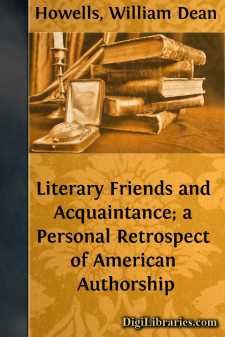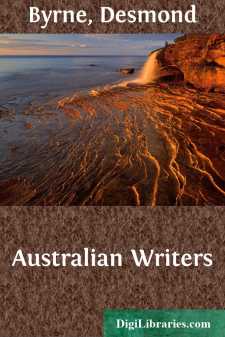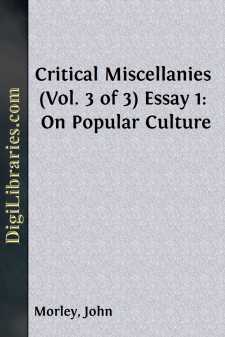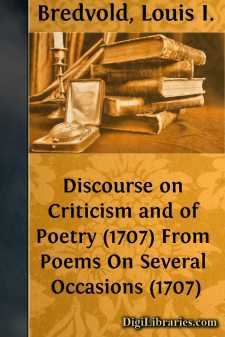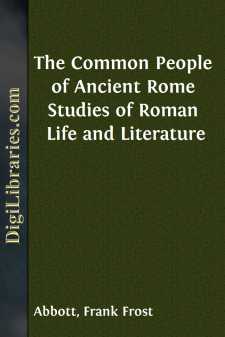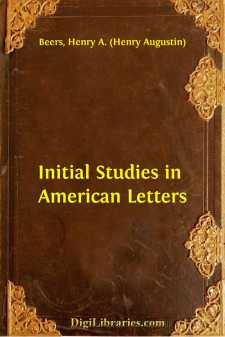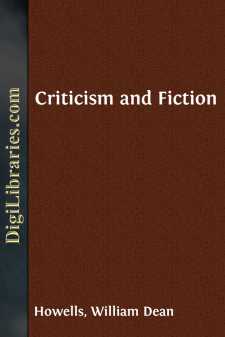Literary Criticism
- American 18
- Ancient and Classical 3
- Asian 1
- Australian & Oceanian 1
- Books & Reading 8
- Caribbean & Latin American 2
- Drama 2
- English, Irish, Scottish, Welsh 49
- European 7
- General 37
- Horror 1
- Humor 2
- Jewish 2
- Medieval 2
- Middle Eastern 3
- Poetry 7
- Renaissance 6
- Russian & Former Soviet Union 1
- Shakespeare 27
Literary Criticism Books
Sort by:
§ 1. THE MAIN (SENTIMENTAL) PLOT OF THE FOUR LOVERS AND THE COURT OF THESEUS "And out of olde bokes, in good feith, Cometh al this newe science that men lere." Chaucer. As the play opens with speeches of Theseus and Hippolyta, it is convenient to treat first of these two characters. Mr. E.K. Chambers has collected (in Appendix D to his edition) nine passages from North's Plutarch's...
more...
Long before I began the papers which make up this volume, I had meant to write of literary history in New England as I had known it in the lives of its great exemplars during the twenty-five years I lived near them. In fact, I had meant to do this from the time I came among them; but I let the days in which I almost constantly saw them go by without record save such as I carried in a memory retentive,...
more...
by:
Desmond Byrne
Any survey of the work done by Australian authors suggests a question as to what length of time ought to be allowed for the development of distinctive national characteristics in the literature of a young country self-governing to the extent of being a republic in all but name, isolated in position, highly civilised, enjoying all the modern luxuries available to the English-speaking race in older...
more...
by:
Julius West
INTRODUCTORYThehabit, to which we are so much addicted, of writing books about other people who have written books, will probably be a source of intense discomfort to its practitioners in the twenty-first century. Like the rest of their kind, they will pin their ambition to the possibility of indulging in epigram at the expense of their contemporaries. In order to lead up to the achievement of this...
more...
by:
John Morley
The proceedings which have now been brought satisfactorily to an end are of a kind which nobody who has sensibility as well as sense can take a part in without some emotion. An illustrious French philosopher who happened to be an examiner of candidates for admission to the Polytechnic School, once confessed that, when a youth came before him eager to do his best, competently taught, and of an apt...
more...
Introduction What little is known of the life of Samuel Cobb (1675-1713) may be found in the brief article in the Dictionary of National Biography by W.P. Courtney. He was born in London, and educated at Christ's Hospital and at Trinity College, Cambridge, where he obtained the degrees of B.A., 1698, and M.A., 1702. He was appointed "under grammar master" at Christ's Hospital in 1702...
more...
How Latin Became the Language of the World How the armies of Rome mastered the nations of the world is known to every reader of history, but the story of the conquest by Latin of the languages of the world is vague in the minds of most of us. If we should ask ourselves how it came about, we should probably think of the world-wide supremacy of Latin as a natural result of the world-wide supremacy of the...
more...
CHAPTER I. THE COLONIAL PERIOD. 1607-1765. The writings of our colonial era have a much greater importance as history than as literature. It would be unfair to judge of the intellectual vigor of the English colonists in America by the books that they wrote; those "stern men with empires in their brains" had more pressing work to do than the making of books. The first settlers, indeed, were...
more...
The question of a final criterion for the appreciation of art is one that perpetually recurs to those interested in any sort of aesthetic endeavor. Mr. John Addington Symonds, in a chapter of 'The Renaissance in Italy' treating of the Bolognese school of painting, which once had so great cry, and was vaunted the supreme exemplar of the grand style, but which he now believes fallen into...
more...
INTRODUCTION. When a small impression of these quaint old books issued from the Chiswick Press, many years ago, under the auspices of the late Mr. S. W. Singer, that gentleman merely designed the copies struck off for presentation to a select circle of literary friends who, like himself, felt a warm interest in every relic of the past which helped to illustrate Shakespeare and ancient English manners....
more...



